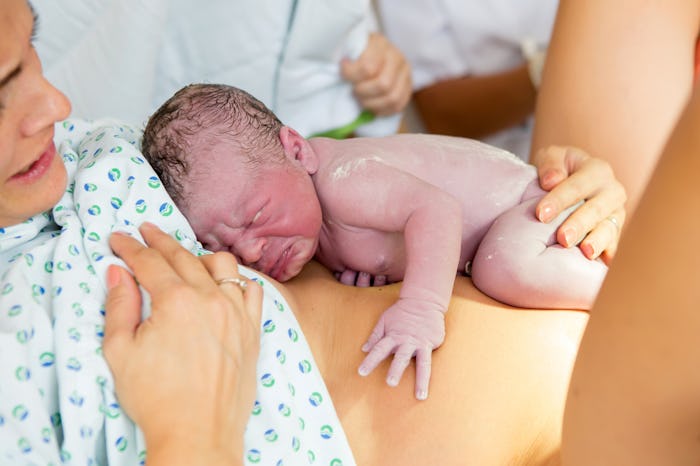Life

7 Of The Kindest Things You Can Do To A Woman Who Endured A Traumatic Birth
When most people envision childbirth, the image doesn't typically include an oxygen mask or the removal of a baby in distress. But that's how labor and delivery looked when I brought my son into the world, and it was a defining moment in my life. It was terrifying, it was distressing, and I had no idea how to process the stark difference between what I assumed birth would be like versus what it was actually like. Thankfully, I realized there are things people can do to help a woman who endured a traumatic birth, and they aren't all that difficult.
I was in labor for three days after I was induced and, honestly, most of it was a blur. I do remember more than a few conversations about the possibility of a cesarean, and I remember thinking that nothing felt "easy" or "normal" about the process. I started losing consciousness when I started pushing, and my son ended up stuck in the birth canal. Manual intervention didn't help, and the umbilical cord ended up wrapping around his neck. When I finally pushed him out the cord snapped, and all I can remember is how blue my baby looked, how frantic and quickly the hospital staff moved, and how a general sense of fear was palpable in the room. If I had been completely clear-headed, I would've panicked.
I didn't know my son was OK for a while, and I didn't know I was bleeding out due to the umbilical cord snapping. Once the dust settled, though, and I was finally able to hold him in my arms, the reality of the situation hit me. To be honest, there are things about that day that still give me an immense amount of anxiety. If my son is in distress for any reason — no matter how minor — I'm triggered. The trauma of a potentially-fatal and scarring birth just doesn't really go away.
Thankfully, I had people in my life that went out of their way to make sure my adjustment period postpartum was as easy as possible. So with that in mind, and because I know I'm not alone, here are some things you can do to help a woman who's had a traumatic birth.
Physically Help Out Around The House
Healing after a traumatic birth is hard, to say the least. The emotional toll a trauma takes only adds to the physical ramifications of a labor and delivery that didn't "go as planned." You can't dictate how quickly you heal, or will yourself into feeling better, either.
So if you really want to help a mother out, step up and take care of some household responsibilities. Clean, take out the trash, do some laundry, cook some meals, and fix whatever needs fixing.
Offer To Drive Her To Any & All Appointments
Whether it's follow-up visits with the OB-GYN, pediatrician appointments for the baby, or counseling to help her process and heal, be her chauffeur for awhile. Not every mother has an available partner (or partner at all), and some don't have family members nearby to step in.
Babysit
If the mom feels comfortable having someone around to help with the baby, offer to babysit. And if the mom has other, older children to care for, definitely offer to babysit.
I had a 5-year-old daughter when I brought my son home. She required a lot of attention that, honestly, I wasn't always prepared or capable to give.
Do All The Cooking
I will never forget the incredible friend who took a whole day out of her busy life to go grocery shopping, make tons of freezer meals for my family to reheat later, and cared for my daughter while I was recovering from my traumatic birth. It was truly the gift that kept on giving.
Be An Advocate
As I said, I was in a haze during the final moments of my second labor and delivery and, well, for a good while after. As a result I needed someone to advocate for me and speak on my behalf. My partner did an OK job in the hospital room, but once we got home and I was trying to come to terms with my traumatic near-death experience, as well as my son's, I wish someone had been there to make sure I had what I needed, when I needed it.
Take Her Mind Off The Trauma
No two experiences are the same, and people react to trauma in different ways. But if you can tell the new mom in your life needs a distraction, bring over a funny movie you both can watch or take her out for a nice dinner or a quick shopping spree. Ask her about literally anything other than motherhood and help her focus on anything but the events that transpired.
Be A Good Listener
Don't trade birthing stories. Don't compare experiences. Don't say things like "everything happens for a reason" and site some personal experience that somehow "proves" it.
Instead, simply listen and allow the new mom to speak about her experience uninterrupted and without judgement. Be there for her. That's really all there is to it.
Check out Romper's new video series, Bearing The Motherload, where disagreeing parents from different sides of an issue sit down with a mediator and talk about how to support (and not judge) each other’s parenting perspectives. New episodes air Mondays on Facebook.